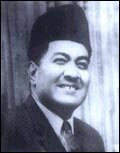Fazlul Qadir Chaudhry facts for kids
Quick facts for kids
Fazlul Quader Chowdhury
|
|
|---|---|

Fazlul Quader Chowdhury
|
|
| 5th Speaker of the National Assembly | |
| In office 29 November 1963 – 12 June 1965 |
|
| Deputy | Ayub Khan |
| Preceded by | Ayub Khan |
| Succeeded by | Ayub Khan |
| Personal details | |
| Born | 26 March 1919 Gohira, Raozan Upazila, Chittagong District, Bengal Presidency, British India, (now Bangladesh) |
| Died | 17 July 1973 (aged 54) Old Dhaka Central Jail , Dhaka, Bangladesh |
| Nationality | Pakistani |
| Political party | Muslim League (Before 1962) Convention Muslim League (1962–1969) |
| Relations |
|
| Children |
|
| Relatives | Zamindar family of Gahira |
| Alma mater | Calcutta Presidency College Calcutta University Law College |
Fazlul Quader Chowdhury (1919–1973) was an important politician from East Pakistan. He became the 5th Speaker of the National Assembly of Pakistan. This means he was in charge of leading meetings and discussions in the country's main law-making body.
He was part of the Convention Muslim League political party, led by Ayub Khan. Sometimes, when Ayub Khan was out of the country, Fazlul Quader Chowdhury even served as the Acting President of Pakistan. His elder brother, Fazlul Kabir Chowdhury, was also a well-known politician.
Contents
Early Life and Family Background
Fazlul Quader Chowdhury was born on March 26, 1919. His family lived in a place called Gahira, in the Chittagong District of what was then the Bengal Presidency. This area is now part of Bangladesh.
His family was a respected zamindar family, which meant they owned a lot of land. His father was Khan Bahadur Abdul Jabbar Chaudhry, and his mother was Begum Fatema Khatun Chaudhrani. His brother, Fazlul Kabir Chowdhury, also became a member of parliament, showing their family's interest in public service.
Education and Early Politics
Chowdhury studied at Calcutta Presidency College. He then earned a law degree from Calcutta University Law College.
In 1941, he was chosen as the general secretary of the All-India Muslim Student Federation. This was a big step in his early political life. He later joined the All-India Muslim League. By 1943, he became the secretary of the party's unit in Chittagong.
Political Career and Contributions
In 1947, Fazlul Quader Chowdhury supported an idea called the United Bengal pact. This plan aimed to keep Bengal united. However, when the decision was made to form Pakistan, he supported that as well.
He was elected as a member of the Pakistan National Assembly in 1962. In Ayub Khan's government, he held several important roles. He worked in ministries like Agriculture and Works, Education and Information, and Labour and Social Welfare. He also helped create the Convention Muslim League in 1962. He became a member of its central committee.
Chowdhury played a key role in establishing several important educational and technical institutions in Chittagong. These include:
- The University of Chittagong
- Chittagong University of Engineering & Technology
- Chittagong Medical College
- Chittagong Marine Academy
- Chittagong Marine Fisheries
- The Polytechnic Institute
These institutions have helped many students get an education and develop important skills.
Personal Life
Fazlul Quader Chowdhury was married to Syeda Selena Akhtar. They had six children together.
His eldest son, Salahuddin Quader Chowdhury, followed in his footsteps and became a politician. He was elected to the Bangladeshi Parliament multiple times. His third son, Giasuddin Quader Chowdhury, also became a parliamentarian. His other children pursued careers in business and industry.
Later Life and Passing
After Bangladesh became independent in 1971, Fazlul Quader Chowdhury was arrested. He passed away in Dhaka Central Jail on July 17, 1973.
Legacy and Family
Fazlul Quader Chowdhury's son, Salahuddin Quader Chowdhury, was a well-known politician in Bangladesh. He served as a member of the Bangladeshi Parliament six times.
 | Claudette Colvin |
 | Myrlie Evers-Williams |
 | Alberta Odell Jones |

